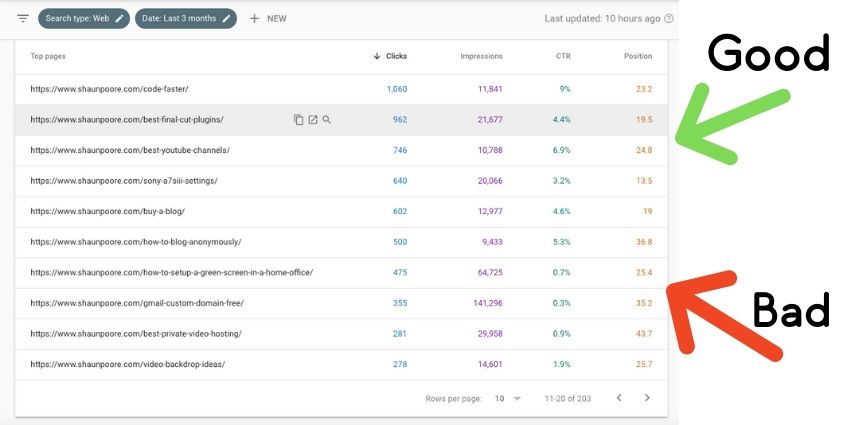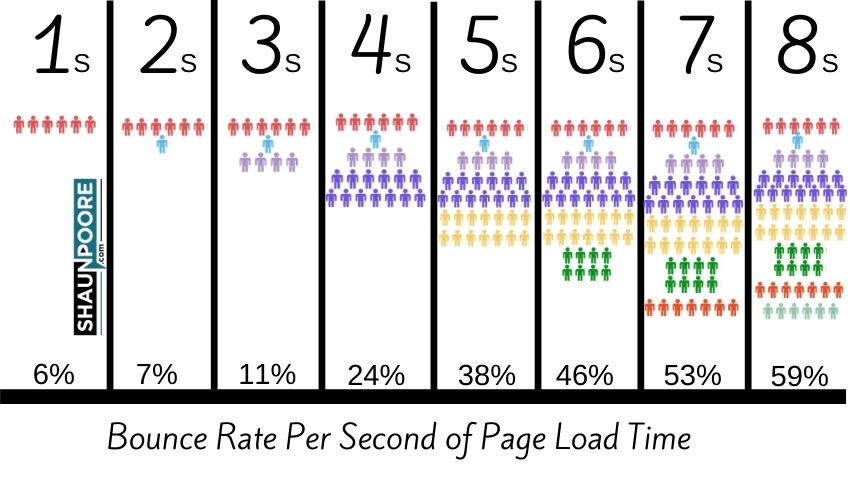Most of your posts won’t rank very high in Google when you start blogging. Here are the top 7 reasons why that happens.
1) You Wrote a Post About Something No-One Would Ever Google
Let’s start with the most obvious problem. If nobody Googles what you wrote about, the article will never get any traffic.
This is also a problem with low-volume keywords. Google needs to test your article before ranking you over the competition. Suppose there’s very little traffic going to the topic. In that case, Google doesn’t have very much data to test your article against the competition. You’ll often see the top spot going to the blog with the most authority when this occurs.
Luckily, there’s a simple solution to this. Follow my advice on keyword research, and you won’t run into this problem all that often.
2) Your Headlines Suck
Clickbait exists because content creators desperately need people to click through to their posts. And while Google actively discourages the extreme clickbait that has become the norm on social media, it’s still essential to create clickable titles.
Even better, test if your titles are actually working. Go into Google Search Console and check your articles’ click-through rate (CTR). Try to determine if the title could be improved on posts with low click-through rates.

Note: a low click-through rate doesn’t necessarily mean your title is bad. Click-through rates drop dramatically between positions 1 and 5 in the SERP. Rates can be as high as 50% for position 1, and likely won’t get above 5% for position 5. Meaning posts with a higher average position should have higher click-through rates.
3) You Don’t Have Enough Domain Authority
I try to avoid focusing on domain authority with this blog. That’s because Moz’s made-up metric to approximate authority is not something Google actually uses. Plus, the proposed solution to low domain authority is link building, and I’m not a big proponent of explicit link-building campaigns.
That said, Google clearly caps traffic on low authority blogs. It’s not a fair system, but it’s how Google currently operates. Completely ignoring authority as the reason you’re not ranking higher would be a foolish thing to do. So what do you do about it? You’re left with a series of mediocre choices.
- Create a lot more excellent content and wait this out.
- Do explicit link-building campaigns.
- Write guest posts.
- Create a product (Google favors sites it sees as a real business, a product will help you establish that).
- Run ad campaigns (Getting traffic to a page that performs well can help boost authority. And AdWords campaigns can help you to improve click-through rates too).
- Succeed on other channels. While Google claims they don’t use social media to determine rank. I firmly believe having a large following on YouTube/Twitter boosts authority.
Keep in mind if you’re a new blogger (your site is less than two years old), your site might just need to get older. The Google sandbox is real (it will be tough to get a lot of traffic in your first 6 months). It also takes at least several months for Google to properly rank every post that you write. So patience is key here.
4) Your Content Sucks
It’s possible that users simply don’t find your blog posts helpful.
We’re extremely biased when judging our own work. My recommendation is to find a successful blogger out there (that you’re not related to) to evaluate this for you. An experienced blogger should be able to spot bad content very quickly.
To make your content “good.” My recommendation is to really think about what the person Googling your article wants to know. Putting the most useful information at the top will go a long way towards making your content better.
5) No Internal Linking Strategy
How many internal links does each of your blog posts have?
I recommend checking out a WordPress plugin called Link Whisper. Link Whisper helps you see how many internal links each blog post has.
Internal linking is a very underutilized ranking opportunity on most blogs. Your popular blog posts will spread authority to other posts if people click the links. Strategizing where to put links on your most popular content can help new posts gain traction.
6) Technical SEO Issues
If you hire an SEO, the first thing they’re going to do is run an SEO audit on your site using a tool like aHrefs (you can run these yourself too). They’ll be looking for the following common problems (and many more).
- No H1, Title tags, or meta descriptions on posts
- Duplicate Content
- No Alt tags on Images
- No HTTPS.
- Not Mobile-Friendly.
- Fails Core Web Vitals.
- Robots.txt blocking.
- Broken Links.
Most sites don’t have significant technical SEO issues. That said, if you do have major technical SEO problems, it can outright kill your entire website. If you’re having traffic issues, this is worth looking at to ensure it’s not the problem.
Another technical SEO subject most bloggers will mention is page speed. Personally, I think Core Web Vitals was overrated as a ranking factor. When I passed CWV, I saw no rise in traffic or rankings.
That said, page speed is a big improvement to user experience. Bounce rates (and conversion rates) perform extremely poorly on slow websites vs. fast ones.

7) The Problem is (Potentially) You
I am not at all trying to victim blame here. You may be doing everything right, and Google is just not rewarding you for it yet (It happened to me in 2021, I wrote 100+ articles and my traffic decreased).
That said, there are many people on forums saying things like, “I wrote 30 posts, where is all my traffic.”
To be successful at blogging, you’re going to need to pump out more content than that. Ask yourself if you’ve genuinely put in the work, and if not, what you can do to improve in the future.
- Are your topic selection and content quality on point?
- Have you done anything at all to increase domain authority?
- Could your website’s theme be improved?
- Is your site technically sound?
- Could you write more articles or hire writers to increase output?
- Etc.
Many people mislead bloggers by telling them they’ll definitely be successful if they just put in the work. I don’t think that’s true; I believe luck and talent are significant factors in your success. That said, if you don’t put in the work, luck and talent are unlikely to matter all that much.


